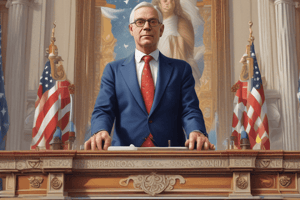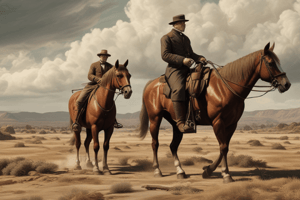Podcast
Questions and Answers
What prompted the rise of progressive politics in the early 1900s?
What prompted the rise of progressive politics in the early 1900s?
- The occurrence of World War I.
- The consolidation of companies into monopolies. (correct)
- The return of rural farming as the primary economic activity.
- The establishment of labor unions nationwide.
What was Theodore Roosevelt's initial political position before becoming president?
What was Theodore Roosevelt's initial political position before becoming president?
- Mayor of New York City.
- Senator of New York.
- Vice President of the United States.
- Governor of New York. (correct)
What impact did the lack of regulations during the early 1900s have on workers?
What impact did the lack of regulations during the early 1900s have on workers?
- Workers were able to negotiate better wages and benefits.
- Workers enjoyed shorter hours and better working conditions.
- Companies were free to impose long working hours and harsh conditions. (correct)
- Workers had no concerns about job security.
Which significant event unexpectedly benefited Theodore Roosevelt’s political ambitions?
Which significant event unexpectedly benefited Theodore Roosevelt’s political ambitions?
What was a common concern among progressives regarding the labor market during the early 1900s?
What was a common concern among progressives regarding the labor market during the early 1900s?
What was a primary characteristic of the political machine in cities during the Progressive Era?
What was a primary characteristic of the political machine in cities during the Progressive Era?
Which amendment allowed the federal government to tax personal income?
Which amendment allowed the federal government to tax personal income?
Which of the following reforms was enacted to change how senators were elected?
Which of the following reforms was enacted to change how senators were elected?
What was one of the key social issues that female activists protested during the Progressive Era?
What was one of the key social issues that female activists protested during the Progressive Era?
Which amendment prohibited the production and sale of alcohol?
Which amendment prohibited the production and sale of alcohol?
Which amendment granted women the right to vote in the United States?
Which amendment granted women the right to vote in the United States?
How did President Theodore Roosevelt contribute to child labor laws?
How did President Theodore Roosevelt contribute to child labor laws?
How did the Progressive Movement aim to change society in the early 1900s?
How did the Progressive Movement aim to change society in the early 1900s?
In what year was the 16th Amendment ratified?
In what year was the 16th Amendment ratified?
What were some limitations of the Progressive reforms during this period?
What were some limitations of the Progressive reforms during this period?
Flashcards
Progressive Politics
Progressive Politics
A political philosophy that aims to reform society by enacting changes to improve the country.
Monopolies in the early 1900s
Monopolies in the early 1900s
Large corporations controlling entire industries without competition, often using harsh business practices.
Industrialization's problems
Industrialization's problems
Industrialization led to new societal issues like unsafe working conditions, child labor, and unchecked corporate power.
Theodore Roosevelt's presidency
Theodore Roosevelt's presidency
Signup and view all the flashcards
Urbanization and city control
Urbanization and city control
Signup and view all the flashcards
Political Machine
Political Machine
Signup and view all the flashcards
Progressive Era
Progressive Era
Signup and view all the flashcards
16th Amendment
16th Amendment
Signup and view all the flashcards
17th Amendment
17th Amendment
Signup and view all the flashcards
Women's Suffrage
Women's Suffrage
Signup and view all the flashcards
18th Amendment
18th Amendment
Signup and view all the flashcards
19th Amendment
19th Amendment
Signup and view all the flashcards
Progressivism
Progressivism
Signup and view all the flashcards
Liberal Philosophy
Liberal Philosophy
Signup and view all the flashcards
Initiative, Referendum, and Recall
Initiative, Referendum, and Recall
Signup and view all the flashcards
Study Notes
Progressive Politics Overview
- Progressivism is a political philosophy focused on societal reform for national prosperity.
- Early 1900s saw rapid industrialization creating new societal problems, like long working hours and child labor.
- Industries consolidated into monopolies, often exploited workers and influenced politics.
Progressive Era Issues
- Working conditions: Factories and mines had dangerous, long workdays (14 hours).
- Child labor: Children were employed in hazardous jobs.
- Alcohol consumption: Concern about widespread alcohol abuse.
- Monopolies: Powerful business groups controlled entire industries, impacting competition and worker treatment.
- Political Machines: Corrupt city governments controlled by wealthy businesspeople.
Progressive Era Reforms
- Theodore Roosevelt: President who tackled child labor and monopolies.
- 16th Amendment (1913): Authorized federal income tax, initially targeted wealthy individuals.
- 17th Amendment: Changed senator election to direct voting by citizens.
- Woodrow Wilson: Progressive president who oversaw the 17th Amendment.
- Women's suffrage movement: Campaign for women's right to vote.
- 18th Amendment (Prohibition): Banned alcohol sale, later repealed.
- 19th Amendment (1920): Granted women the right to vote.
Progressive Political Reforms (Initiative, Referendum, Recall)
- Referendum: Voters directly decide on legislation.
- Recall: Voters remove elected officials.
- Initiative: Voters propose and enact legislation.
Progressive Leadership
- Robert La Follette ('Battling Bob'): Wisconsin politician who championed Progressive ideals.
- William Jennings Bryan: Public speaker who promoted referendum, recall, and initiative ideas.
Progressive vs. Liberal
- Progressives: Central government intervention for societal good.
- Liberals: Primarily concerned with individual rights and freedoms.
Modern Progressivism
- Focuses on systemic issues like income inequality.
- Affordable Care Act (ACA) is an example of modern progressive reform aiming for health equity.
Studying That Suits You
Use AI to generate personalized quizzes and flashcards to suit your learning preferences.




